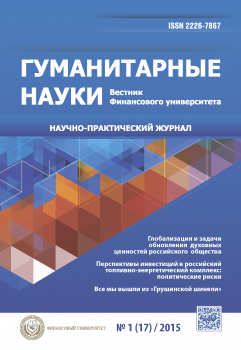Globalization exerts contradictory impact on the political processes in the countries of «new democracy» which sprang up in the last decades of the XXth century in the course of «the third wave» democratization. Globalization created favorable conditions for the transition from authoritarian and totalitarian dictatorships towards democracy in many countries. But later on globalization turned into an obstacle in the way to the consolidation of democratic regimes. Globalization in economic, political and cultural spheres contributed to the increase of the number of democratic regimes thanks to the following factors: rise in average standards of living, stricter control on the part of international organizations over human rights observance, mass media spreading of democratic values in mass conscience. However starting from the mid-nineties of the last century there appeared some signs of «the democratic wave» decline that was expressed in the rise of the share of the so-called «non-liberal democracies». Many governments in the countries of «new democracy» pursue a policy of setting a limit to the institutional offer of political freedom. The ruling elites consider this type of policy to be essential so as to boost the competitiveness of their national economies, which are involved in the global division of labor, at the expense of minimization of domestic social costs. The rise of political protests which seem inevitable in these circumstances can be effectively curbed only by the means of «low-intense» democracy. However it should be stressed that coming up of «non-liberal democracy» in «the third wave» countries is the result of low public demand for political freedom that largely took shape in the process of globalization. Globalization narrowed the possibilities of «new democracies» to pass the limits of the economic «periphery» and in this way it blocked the increase of the number of people who have self-expression values and who become the convinced adherents of liberal democracy. Values of survival prevail in mass conscience and for these reasons utilitarian motives predominate when it comes to giving support to the democratic system of government. As a result «non-liberal democracy» has spread and has taken root in most countries of «the third wave».
globalization, global economy, «the third wave», democratization, non-liberal democracy, values of survival, values of self-expression, the countries of «new democracy», the consolidation of democracy.
1. Kheld D. Global’nye transformatsii: Politika, ekonomika, kul’tura [Global Transformation: Politics, economy, culture]. Moscow, Praxis Publ., 2004, 576 p.
2. Giddens E. Uskol’zayushchiy mir: kak globalizatsiya menyaet nashu zhizn’ [Missing Peace: globalization is changing our lives]. Moscow, All The World Publ., 2004 p.
3. Lipset S. Politicheskiy chelovek: sotsial’nye osnovy politicheskoy zhizni [The political man: the social basis of political life]. Teoriya i praktika demokratii [Theory and practice of democracy]. Moscow, Ladomir Publ., 2006. 496 p.
4. Linz J.& Stepan A. Problems of democratic transition and consolidation: southern Europe, South America, and post-communist Europe. The Johns Hopkins Press Ltd., London, 1996. 479 p.
5. Pshevorskiy A.,Al’vares M., Cheybub A., Limondzhi F. Ekonomicheskoe razvitie i politicheskie rezhimy [Economic development and political regimes]. Teoriya i praktika demokratii [Theory and practice of democracy]. Moscow, Ladomir Publ., 2006. 496 p.
6. Freedom House Available at: www.freedomhouse.org (Accessed: 01.09.2015).
7. Fukuyama F. Konets istorii i posledniy chelovek [The End of History and the Last Man]. Moscow, OOO AST Publisher: ZAO NPP «Ermak», 2004. 588 p.
8. Daymond L. Proshla li «tret’ya volna» demokratizatsii? [Have the “third wave” of democratization?]. Politicheskie issledovaniya [Political researches]. 1999. I1. P.18.
9. Pshevorskiy A. Demokratiya i rynok. Politicheskie i ekonomicheskie reformy v Vostochnoy Evrope i Latinskoy Amerike [Democracy and the market. Political and economic reforms in Eastern Europe and Latin America]. Moscow, “Russian Political Encyclopedia” (ROSSPEN) Publ., 2000. 320 p.
10. Khantington S. Tret’ya volna. Demokratizatsiya v kontse 20v. [The Third Wave. Democratization in the late 20th century]. Moscow, “Russian Political Encyclopedia” (ROSSPEN) Publ., 2003. 368 p.
11. Rodrik D. Paradoks globalizatsii: demokratiya i budushchee mirovoy ekonomiki [The paradox of globalization: democracy and the future of the world economy] Moscow, Publishing House of the Gaidar Institute, 2014. 576 p.
12. O. Donnell Sleduet li slushat’sya ekonomistov? [Should we listen to the economists?] Avialable at: www.russ.ru/journal/predely/97-11-11 (Accessed: 01 September 2015)/
13. Inglkhart R., Vel’tsel’ K. Modernizatsiya, kul’turnye izmeneniya i demokratiya. Posledovatel’nost’ chelovecheskogo razvitiya [Modernization, Cultural Change and Democracy. The sequence of human development] A new publishing house, 2011. 464 p.
14. Global’noe soobshchestvo: novaya sistema koordinat [The global community: a new coordinate system]. St. Petersburg, Aletheia Publ. 2000. 314 p.





